The Left Needs a Better Message on Crime
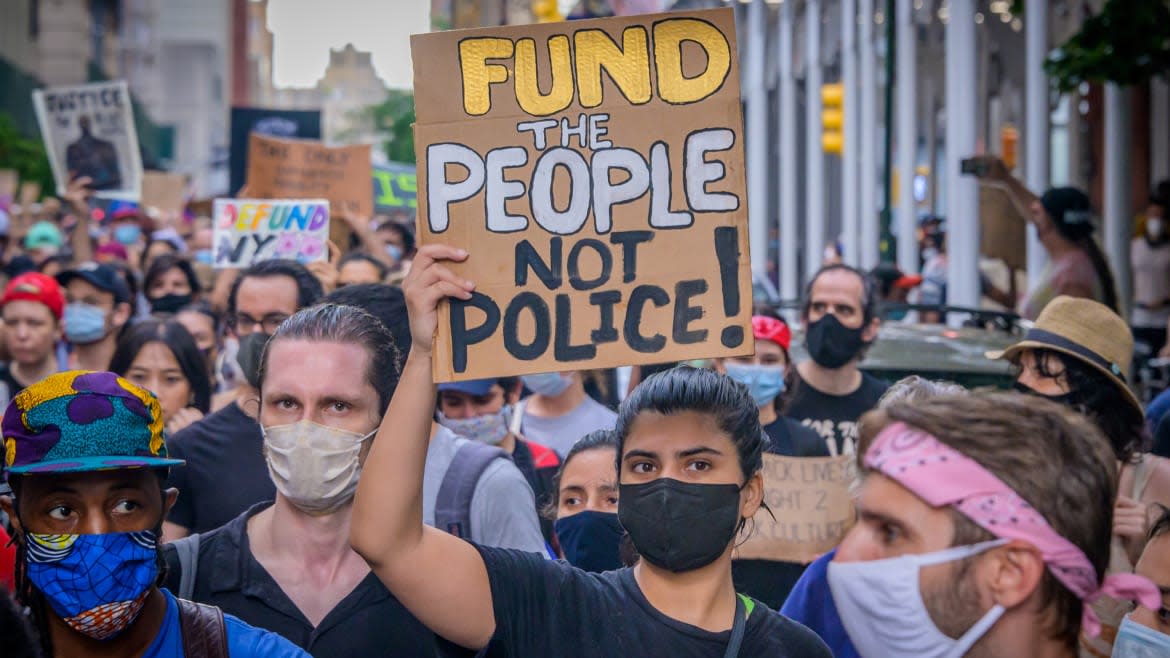
- Oops!Something went wrong.Please try again later.
Last week’s election was a grim reminder of how much juice conservatives get from putting crime at the forefront of voters’ minds.
Sure, Democrats are jubilant about holding onto their paper-thin Senate majority—but they lost the House. That happened in large part because, while the “red wave” turned out to be more of a red trickle in the country as a whole, there were parts of New York state where the election results really were a bit like the scene where the elevator doors open in The Shining.
Republicans took all the House seats on Long Island, made huge inroads in the suburbs north of New York City, and Democratic Gov. Kathy Hochul won a way-too-close race against a wacky election denier. The Republican campaign in New York was all about crime—and it was mostly a winner for them.
Democrats Averted Disaster, But the Working Class Did Not
Progressives, for their part, often seem unsure how to address the issue—especially the kind of progressives who are closest to my democratic socialist politics. All too often, the left’s instinct is to run away from talking about it or even to dismiss anyone who expresses concern about violent crime as a purveyor of “copaganda.”
A better approach would be to take working-class people’s very real concerns about public safety seriously, stop trading in libertarian rhetoric about getting better public services by slashing funding levels—which makes no more sense when it comes to proposals to “defund the police” than it does in any other area. Instead, they should focus on the core message that the most effective way to reduce the crime rate in the long run is by creating a more equal society where everyone’s material needs are met.
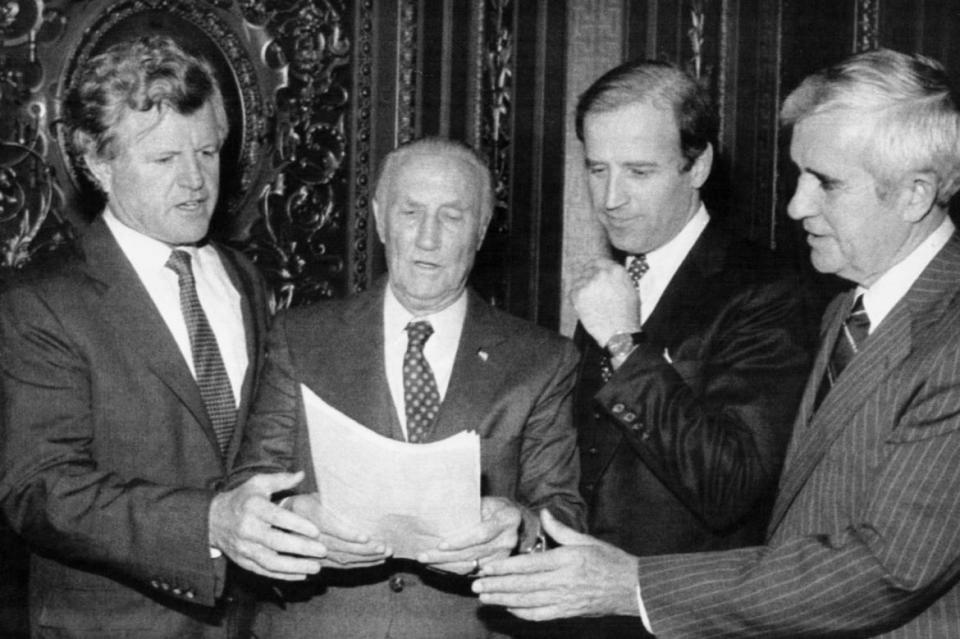
Sens. Edward Kennedy, Strom Thurmond, Joe Biden, and Paul Laxalt look at the 1984 crime bill after it passed.
The Changing Politics of Crime on the Left
Mainstream Democrats were all about lock-‘em-up-and-throw-away-the-key “tough on crime” policies up until, in the greater scheme of things, about five minutes ago. Vice President Kamala Harris, for example, used to go on and on about what a “tough prosecutor” she’d been in California. President Joe Biden once bragged that the original version of the Crime Bill he wrote in 1991 did everything short of “hanging jaywalkers.”
The politics of that issue have dramatically changed in the last few years—especially after the national unrest following the brutal police murder of George Floyd in 2020. That’s a good thing.
The old approach was intimately tied to what’s often called “neoliberalism”—the revival of a more laissez faire approach to economics even within traditional left and liberal political parties around the world that played out between the 1970s and 1990s. In the United States, instead of building on the Great Society welfare state LBJ had started to build in the 1960s, a bipartisan consensus was formed, which preferred to manage the social ills arising from poverty with a harsher regime of policing and incarceration.
The extent to which mainstream Democrats have truly reversed course from those “tough on crime” policies is, in practice, not always impressive. Even on an issue as wildly popular as marijuana legalization, Biden hasn’t actually been able to bring himself to let anyone out of federal prison. (His recent pardon was so narrowly tailored that the only beneficiaries were people who’d already served their time.) But at least Democrats aren’t foaming at the mouth about hanging jaywalkers anymore. And at least in some places, reforms have been enacted like the abolition (for most crimes) of cash bail in New York.
Putting aside more centrist Democrats like Biden and Harris, the actual left has pushed much harder on criminal justice reform.
Donald Trump and Mike Pence Launch the Political Comebacks No One Wants
Rep. Alexandria Ocasio-Cortez and the rest of the congressional “Squad” energetically promoted the “defund the police” slogan in 2020. Leftists who have been elected to district attorney positions in some cities, like Larry Krassner in Philadelphia or (until recently) Chesa Boudin in San Francisco, have worked overtime to use their prosecutorial discretion to ensure that fewer residents of those cities end up behind bars.
And an organization that some of these politicians have been at least loosely aligned with, the Democratic Socialists of America, has gone even further. DSA has gone on record as supporting “abolition” of police and prisons—whatever that actually means.
The Absurdity of “Abolitionism”
Full disclosure: I’m a DSA member.
Even if the organization sometimes puts out statements that I find embarrassingly poorly thought-out, the vast majority of its time and energy goes in directions I would sign off on without reservation—like fighting for Medicare for All, pushing for a less hawkish foreign policy, and keeping alive important big-picture ideas about how the economic foundations of our society could be restructured in a more egalitarian direction.
DSA activists have also been involved in important efforts like the unionization drives at Starbucks stores around the country. They’ll continue to get my dues money every month.
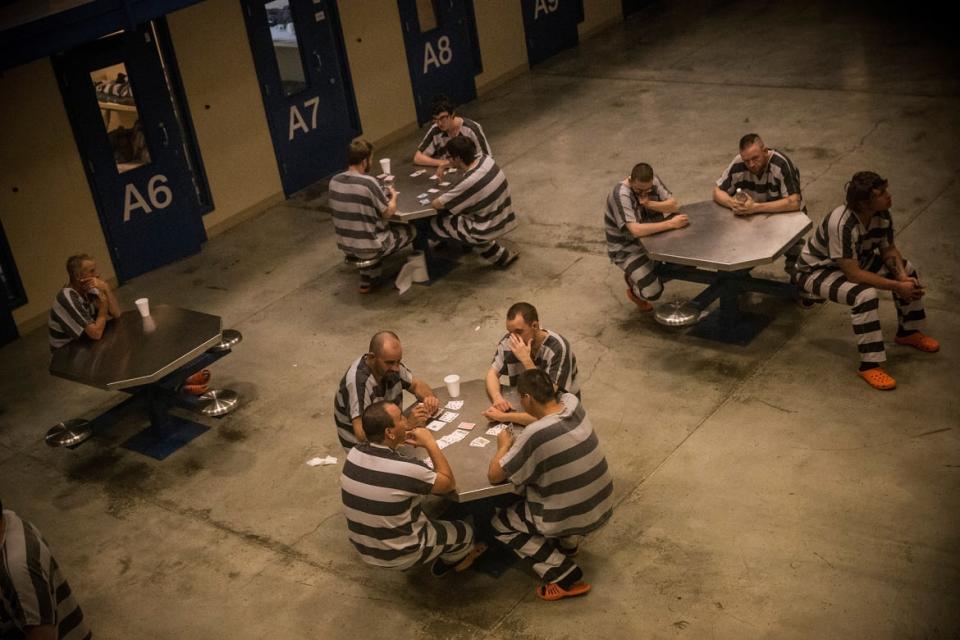
Inmates sit in the county jail on July 26, 2013, in Williston, North Dakota.
But “abolitionism” about policing and prisons really is a shockingly poorly thought-out idea—the kind of thing you only say if you’re so far removed from the levers of national power that you feel comfortable never spending a minute thinking about how any of this would work in practice. At least in my experience, “abolitionists” are unable to answer the most basic follow-up questions about how public safety would work post-“abolition.”
Would vigilantes just informally patrol their neighborhoods—like George Zimmerman was doing when he killed Trayvon Martin? Or would there still be some sort of publicly owned entity in charge of law enforcement? If so, how would such an entity not just be a reformed version of the police? And without some form of imprisonment, no matter how humane and minimalistic, would the only remaining strategy for dealing with violent criminals who pose an ongoing threat to their communities be to kill them?
If you read, for example, Angela Davis’s book on prison abolition, exactly zero of these questions are answered. And any movement that was serious about persuading a majority of the American public would have to come up with answers pithy enough for door-to-door canvassing.
“Defund the Police” and the Dilemmas of Local Reform
Perhaps such questions would be moot in an advanced socialist society that might exist in the 23rd century when poverty is something people read about in history books. But in a country like the United States in 2022, where street crime is a real problem many working-class people worry about, “abolitionism” sounds like a recipe for private security for rich people and Mad Max for everyone else.
I certainly want less militarized, more accountable police forces and smaller, more rehabilitation-focused prisons. But I’m somewhat skeptical of the idea that we could completely get rid of police and prisons even in the 23rd-century utopia just described.
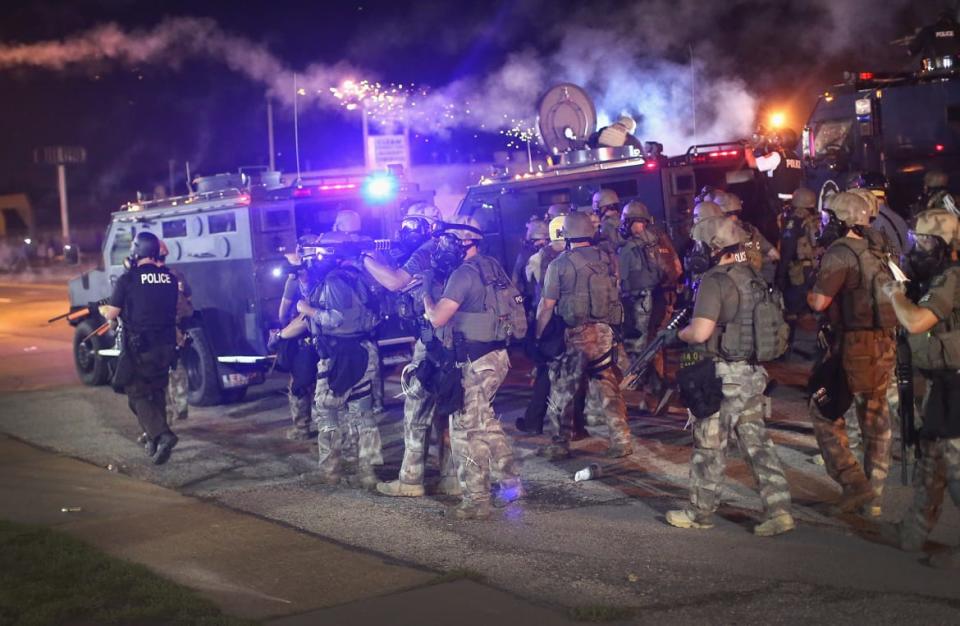
Police advance while sending a volley of tear gas toward demonstrators protesting the killing of teenager Michael Brown on Aug. 17, 2014, in Ferguson, Missouri.
Too many affluent people are domestic abusers or rapists, for example, for me to believe that economic conditions are the only source of interpersonal violence. But I don’t have any trouble believing that the main drivers of violent crime would be dramatically reduced in such a society. We have plenty of real-life evidence that it can be greatly reduced even given steps that take us only a small part of the way there.
Norway, for example, has both a far lower rate of violent crime than we do—and a far more humane criminal justice system. If you believe that it’s because the people there are genetically or culturally primed to be nice people who don’t do violent things, I’d strongly recommend that you watch Robert Eggers’s film The Northman.
The reason Nordic countries are able to have their cake and eat it too on criminal justice is that strong labor unions and socialist political parties have secured reforms that (even if they fall short of the imaginary 23rd-century paradise) take their societies in a far more economically just direction. Even if we restrict ourselves to the U.S., there’s a reason very few kids of any ethnic background grow up in middle-class suburbs and go on to join street gangs.
Democrats Are Deer in the Headlights on Crime Problem
The problem for Americans (like me) who want a more humane and minimalistic criminal justice system is that we don’t live in such a society. And the left—the real left—is far too structurally weak right now to take over the levers of power on a national scale to start implementing the reforms that would take us in that direction. But we can sometimes win district attorney elections in deep blue cities. And there we can, on a very small scale, try to chip away at the carceral state.
The problem is that—given that we live in a society afflicted by poverty, deep economic inequality, and all the social ills that come with those things—even “defunding” the police in the sense of reducing budget lines (but not to zero) is extremely unpopular with the working-class people of all races who would form the base of any successful version of the left.
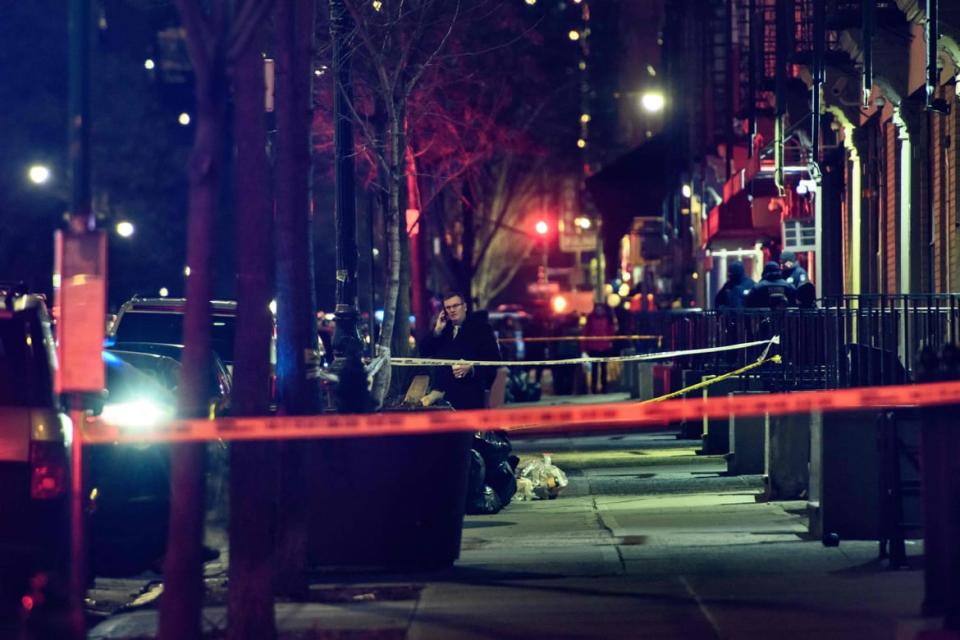
A taped-off area marking the scene of a shooting in Harlem, New York, on Jan. 22, 2022.
A recent survey by the Kaiser Family Foundation found that only 17 percent of Black voters want to decrease police funding in their area, twice as many want to increase it, and a majority want to keep it as is.
In the larger context of a neoliberal hellscape where crime is far worse than it is in places like Norway, reform-minded local DAs trying their best to chip away at the carceral state are often faced with difficult tradeoffs. If you decide not to prosecute a given offender, they might do something violent the next day. Every time this happens, you’ve added fuel to the fire of right-wing efforts to discredit any efforts at reform. On the other hand, if you decide to err on the side of prosecution and pushing for jail time in every instance, what was the point of electing a reformist DA?
Even a policy as straightforward as ending cash bail is fraught with pitfalls. As a socialist, I abhor the very idea that one suspect could end up rotting in jail while they wait for trial because of a lack of money—while another could go free immediately if they can scrounge up the cash. But the bail reform law in New York creates new problems. In an effort “to preserve the presumption of innocence and reduce racial biases against defendants” the law specifically prevents judges from considering “their subjective view of a person’s ‘dangerousness’ when deciding what release conditions to set.”
I can understand why legislators were moved to impose that condition. Without it, the reform would have had far less teeth. But with it, the predictable consequence is that sometimes even obviously dangerous suspects have to be put back on the streets, and whenever this leads to bad consequences, the lock-‘em-up-and-throw-away-the-key right has a new talking point.
I don’t claim to have all the answers to these dilemmas—and to be clear, if I’d lived in Philadelphia or San Francisco, I would have absolutely voted for Krassner or Boudin. I haven’t seen convincing statistical evidence that their approach leads to worse results overall than the harsher decisions of more mainstream DAs in comparable cities, and I’d rather err on the side of re-electing people at least trying to do the right thing than empowering cynical opportunists trying to score “tough on crime” points.
But I worry that some of my fellow leftists, who also don’t have great answers about how to navigate these tradeoffs, end up lashing out at anyone who raises legitimate concerns about crime by accusing them of spreading “copaganda.” While many of the politicians who spent 2020 talking about “defund” have quietly dropped that terminology in response to public backlash, they and their supporters still tend to bristle at any criticism of the slogan—and in absence of a more compelling message, they all too often default to just not talking about crime at all. Any expression of alarm over recent upticks in the crime rate is met with the response that the rates is still much lower than it was in decades past.
As New York magazine’s Eric Levitz points out, progressives would rightly reject parallel arguments in other contexts:
Yes, America’s murder rate is lower today than it was in the early 1990s. But so is the percentage of Americans who lack health insurance. In 2018, progressives did not lambast the media for covering a modest increase in the uninsured rate because things were still better than they’d been in 1998. Rather, we pointed to the negligible uninsured rates of other developed countries, and declared the performance of America’s health-care system a persistent scandal. If our nation’s uninsured rate should be judged by the standard of other wealthy countries, why shouldn’t its murder rate be judged by the same metric?
As Levitz suggests, a better approach would be to emphasize that many policies the left supports have been proven to reduce the rates of violent crime.
Pushing Total Bullshit Misinformation Is Not ‘Healthy Skepticism’ of the Powerful
Most obviously, tightening requirements for handgun purchases has “yielded dramatic reductions in firearm homicide rates.” More interestingly, policies like minimum wage hikes and increases in the Earned Income Tax Credit that funnel more money to the people who need it most have been shown to reduce recidivism among ex-convicts. Unsurprisingly, given the role of addiction, mental health problems, and financial desperation in fueling various kinds of crime, increased access to healthcare has also been shown to have a salutary effect.
The left can’t afford to cede this issue to our political enemies. And telling working-class people in high crime neighborhoods not to worry about it because the problem used to be even worse is a recipe for disaster. Instead, we should be laser-focused on the simple and true message that America’s crime rate is downstream of brutal economic inequality.
The recipe for safe streets, a human criminal justice system, and a population with hope for the future is to move toward a society that distributes resources more equitably and meets everyone’s material needs. That’s the message the left should be shouting from the rooftops.
Get the Daily Beast's biggest scoops and scandals delivered right to your inbox. Sign up now.
Stay informed and gain unlimited access to the Daily Beast's unmatched reporting. Subscribe now.

